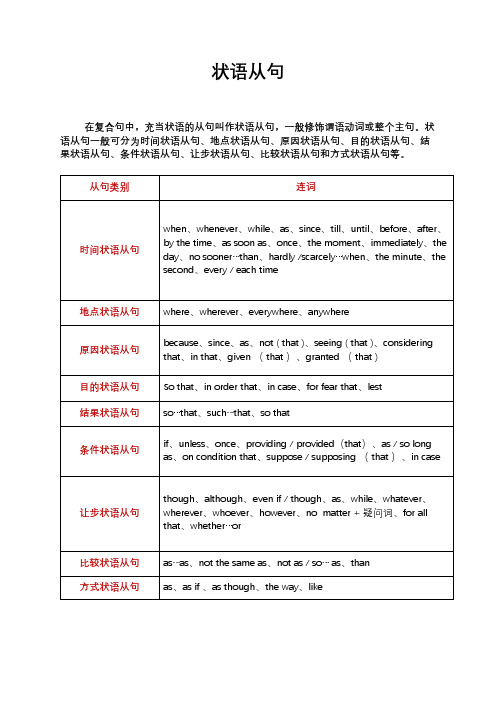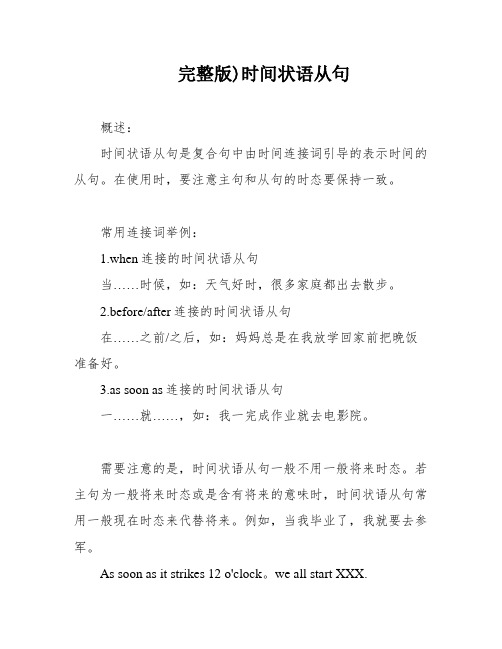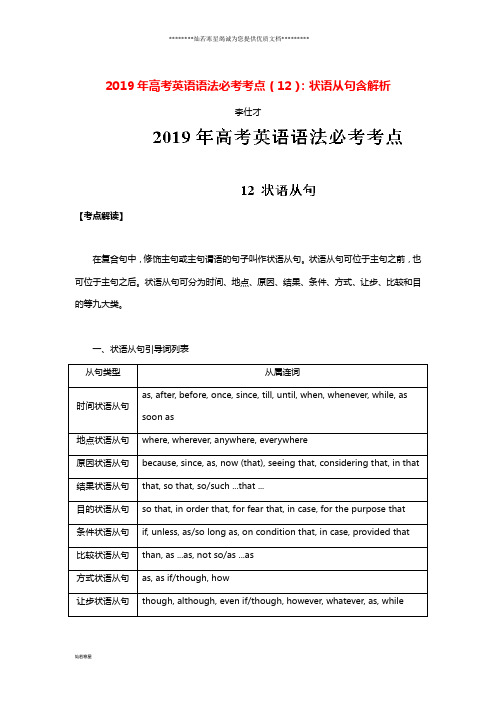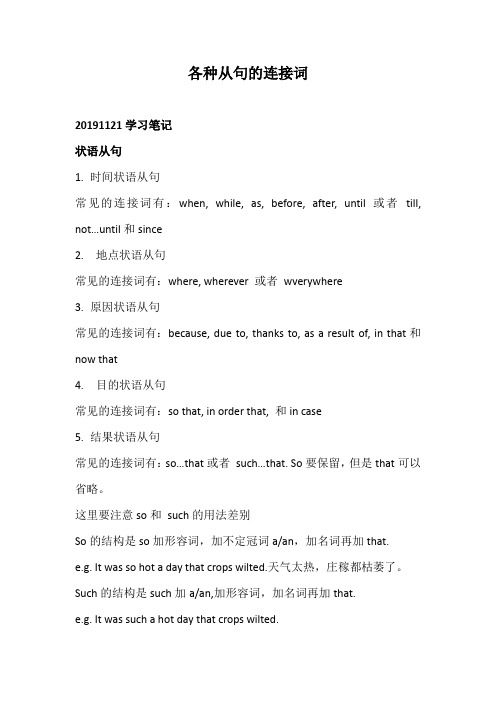when, if, before, until从句
英语语法:状语从句归纳整理

状语从句在复合句中,充当状语的从句叫作状语从句,一般修饰谓语动词或整个主句。
状语从句一般可分为时间状语从句、地点状语从句、原因状语从句、目的状语从句、结果状语从句、条件状语从句、让步状语从句、比较状语从句和方式状语从句等。
一、时间状语从句在复合句中起时间状语作用的从句称为时间状语从句,可放在句首、句中或句尾。
(二)until 和 till的用法1.肯定句:主句的谓语动词必须是延续性动词,主句、从句都为肯定式,意为“直到……为止”;2.否定句:主句的谓语动词必须是非延续性动词,从句为肯定式,表示“某动作直到某时才开始”;3.till 不可以置于句首,而until可以。
例:They waited till / until I returned.他们一直在等我回来。
You may stay here until / till the rain stops.你可以待在这里直到雨停。
He won’t go to bed until / till she returns.直到她回来,他才上床睡觉。
Until you told me I had no idea of it.直到你告诉我,我才知道这件事。
(三)since的用法(四)before的用法一般情况下before表示“在……之前”,有时根据上下文,还可表示“还未……就……” “不到……就……” “……才……” “趁……还未……”等例:Please write it down before you forget it.趁你还没忘,请把它记下来。
I must finish this letter before I go home.我必须在回家之前完成这封信。
Before I could get in a word, he had measured me.我还没来得及插话,他就给我量好了尺寸。
We had sailed four days and four nights before we saw land.我们航行了四天四夜才看到陆地。
状语从句(9种

1.时间状语从句常用引导词:when, as, while, as soon as, before, after, since , till, until特殊引导词:the minute, the moment, the second, every time, the day,the instant, immediately , directly, no sooner … than, hardly …when, scarcely … whenI didn’t realize how special my mother was until I became an adult.While John was watching TV, his wife was cooking.The children ran away from the orchard(果园), the moment they saw the guard.No sooner had I arrived home ,then it began to rain.Every time I listen to your advice, I get into trouble.2.地点状语从句常用引导词:where特殊引导词:wherever, anywhere, everywhereGenerally, air will be heavily polluted where there are factories.Wherever you go, you should work hard.地点状语从句§4地点状语从句 (adverbial clause of place) 地点状语从句一般由连接副词where, wherever等引导,已经形成了固定的句型,例如:句型1:Where+地点从句,(there)+主句。
【注意】此句型通常译成“哪里……哪里就……”;主句在从句后面时,there可用可不用;如果主句在从句的前面时,一般都不用there。
状语从句

7.比较状语从句 由than、as…as引导。如: Jim is taller than me. 吉姆比我高。 Lucy jumps as far as Lily. 露茜和莉莉跳得一样远。 8.方式状语从句 由as、as if等引导。如: Please do as I do. 请像我这样做。 She lay down as if she was ill. 她躺着似乎是病了。 9.让步状语从句。 通常由though、although、even if、Whatever等 引导。如: There is air around us, though we can't see it. 我们周围都是空气,尽管我们看不到。
Байду номын сангаас
(改错)
《中考指导》
中考考点2: if表 “是否”引导宾语从句可用将来时. C 考题:I don’t know if he __. If he __ , I’ll tell you. A. will come, will come B. comes, will come C. will come, comes D. comes, come 《中考指导》 中考考点3: “祈使句 + and (or)+ 陈述句” 在意思上相 当 于一个带有条件状语从句的复合句。
中考考点3:※※※while从句用进行时 were readinng e.g.1) My parents _______________ (read) some newspapers while I ____________ (play) with my e-dog this was playing time yesterday.《中考指导》 2) While we ____________ (travel) in were travelling Australia last year, I visited Lucy who once taught English in our school. (上海市2004)
完整版)时间状语从句

完整版)时间状语从句概述:时间状语从句是复合句中由时间连接词引导的表示时间的从句。
在使用时,要注意主句和从句的时态要保持一致。
常用连接词举例:1.when连接的时间状语从句当……时候,如:天气好时,很多家庭都出去散步。
2.before/after连接的时间状语从句在……之前/之后,如:妈妈总是在我放学回家前把晚饭准备好。
3.as soon as连接的时间状语从句一……就……,如:我一完成作业就去电影院。
需要注意的是,时间状语从句一般不用一般将来时态。
若主句为一般将来时态或是含有将来的意味时,时间状语从句常用一般现在时态来代替将来。
例如,当我毕业了,我就要去参军。
As soon as it strikes 12 o'clock。
we all start XXX.Upon our arrival。
XXX.4.时间状语从句中使用until表示一个动作一直持续到某一时刻,例如:He waited until all the people left。
我们也可以说I didn't go to bed until Mum came back。
表示直到妈妈回家后我才上床睡觉。
5.当while连接时间状语时,表示主句的行为在从句行为过程之中发生。
从句中要使用持续性动词或状态动词,并且持续性动词通常使用进行时态。
例如:While they were waitingfor the New Year。
they listened to music。
sang songs and had fun.Till and until are used to introduce time clauses in affirmative sentences。
with the main clause verb being a continuous n or state that lasts until the time XXX: XXX。
高考英语语法必考考点(12)状语从句(含解析)

2019年高考英语语法必考考点(12):状语从句含解析李仕才【考点解读】在复合句中,修饰主句或主句谓语的句子叫作状语从句。
状语从句可位于主句之前,也可位于主句之后。
状语从句可分为时间、地点、原因、结果、条件、方式、让步、比较和目的等九大类。
一、状语从句引导词列表从句类型从属连词时间状语从句as, after, before, once, since, till, until, when, whenever, while, as soon as地点状语从句where, wherever, anywhere, everywhere原因状语从句because, since, as, now (that), seeing that, considering that, in that 结果状语从句that, so that, so/such ...that ...目的状语从句so that, in order that, for fear that, in case, for the purpose that条件状语从句if, unless, as/so long as, on condition that, in case, provided that 比较状语从句than, as ...as, not so/as ...as方式状语从句as, as if/though, how让步状语从句though, although, even if/though, however, whatever, as, while【点睛】(1)上述有些连词除了能引导状语从句外,还可引导定语从句和名词性从句。
在使用的时候,要根据句子结构和句意来判别和区分不同的从句,正确使用引导词。
以where为例,试比较下列多种从句的区别。
You are to find it where you left it. (地点状语从句)Tell me the address where he lives. (定语从句,先行词为the address)I don’t know where he came from. (宾语从句)Where he has gone is not known yet. (主语从句)This place is where they once hid. (表语从句)(2)在两个分句间要有一个且只有一个连词,千万不能按汉语习惯。
各种从句的连接词

各种从句的连接词20191121学习笔记状语从句1.时间状语从句常见的连接词有:when, while, as, before, after, until 或者till, not…until和since2.地点状语从句常见的连接词有:where, wherever 或者wverywhere3.原因状语从句常见的连接词有:because, due to, thanks to, as a result of, in that和now that4.目的状语从句常见的连接词有:so that, in order that, 和in case5.结果状语从句常见的连接词有:so…that或者such…that. So要保留,但是that可以省略。
这里要注意so和such的用法差别So的结构是so加形容词,加不定冠词a/an,加名词再加that.e.g. It was so hot a day that crops wilted.天气太热,庄稼都枯萎了。
Such的结构是such加a/an,加形容词,加名词再加that.e.g. It was such a hot day that crops wilted.注意了吗:so hot a day和such a hot day6.条件状语从句常见的连接词有:if, unless, as long as, 和on condition that7.让步状语从句常见的连接词有:though, although, even if, even though和as.注:as引导让步状语从句时,在表示“虽然”的时候,句子要用倒装结构。
e.g. Hard as she works, she makes very little progress.虽然她很努力,但是没怎么进步。
8.比较状语从句除了常见的as和than,比较状语从句还有其他特殊的引导词,比如the more…the more…和no more…than9.方式状语从句常见的连接词有:as if, as though和in the way that或者the waye.g. He looks as if he is angry.他看起来好像生气了。
时间状语从句的用法

时间状语从句及用法一、普通类从属连词引导时间状语从句的普通类从属连词有when(当……时),while (在……期间),as(当……,一边……一边……),before(在……之 前),after(在……之后),since(从……以来),till/until(直到),whenever (无论何时),as soon as(一……就)等。
如:When I went into the classroom, he was reading. 当我走进教室时,他正在看书。
He read a newspaper as he went along. 他边走边看报纸。
We must strike while the iron is hot. 我们必须趁热打铁。
I will tell you after they leave. 于他们走后我再告诉你。
I told him to come back whenever he wants to. 我告诉他什么时候想回来就回来。
I waited till/until she was back. 我一直等到她回来。
Once time is gone, you will never get it back. 时间一旦失去就再也得不到了注意:在时间状语从句中,不能用一般将来时、过去将来时态或将来完成时,而要用相应的一般现在时态、一般过去时或现在完成时来代替。
如:I’ll telephone you as soon as I get there. 我一到达那里就打电话给你。
She said she would phone me as soon as she got there. 她说她一到达那里就给我电话。
Don’t get off the bus until it has stopped. 等车停稳后才下车。
二、含 time的短语可引导时间状语从句的time短语有every time, each time, (the) next time, (the) last time, by the time, the first time, any time等。
英语八类状语从句的用法归纳

英语八类状语从句的用法归纳一、概说状语从句即指在主从复合句用作状语的从句。
按照其意义,状语从句可分为时间状语从句、地点状语从句、原因状语从句、目的状语从句、结果状语从句、条件状语从句、让步状语从句等。
状语从句是高中英语学习中的一个语法重点,也是历年高考重点考查的内容之一。
学习状语从句主要应注意引导状语从句的从属连词的用法与区别,以及从属连词在一定的语言环境中的意义与用法。
二、时间状语从句1.引导时间状语从句的从属连词很多,常见的有before, after, when, while, as, since, till, until, as soon as 等。
2.表示“当…时候”的while, when, as 的用法区别是:while从句中的谓语动词必须是延续性动词;表示带有规律性的“每当”或当主、从句谓语动词的动作发生有先后时,只能用when;当表示“一边…一边…”或“随着”时,只能用as。
另外,用于此义的as 所引导的时间状语从句谓语只能是动作动词,不能是状态动词。
如下面一道高考题的答案是B 而不能是A:“I’m going to the post office.” “_____ you’re there, can you get me some stamps?”A. AsB. WhileC. BecauseD. If3.until 在肯定句中通常只连用延续性动词,表示相应动作结束的时间;在否定句中通常连用非延续性动词,表示相应动作开始的时间,意为“直到…才”。
如:He waited until she was about to leave. 他等着一直到她准备离开。
I did not begin to work till he had gone. 他走了后我才开始工作。
4.表示“一…就”除用as soon as 外,还可用the minute, the second, the instant, immediately, directly, i nstantly, no sooner…t han, hardly…w hen 等。
- 1、下载文档前请自行甄别文档内容的完整性,平台不提供额外的编辑、内容补充、找答案等附加服务。
- 2、"仅部分预览"的文档,不可在线预览部分如存在完整性等问题,可反馈申请退款(可完整预览的文档不适用该条件!)。
- 3、如文档侵犯您的权益,请联系客服反馈,我们会尽快为您处理(人工客服工作时间:9:00-18:30)。
when if before until引导的从句由一个主句和一个或多个从句构成的句子叫复合句。
主句是复合句的主干部分,从句是修饰主句或主句的某个成分的。
从句不能单独成句,但具有主语和谓语,须由关联词引导。
根据从句在主句中充当不同的成分,可分为不同的从句,例如,主语从句、宾语从句、表语从句、同位语从句、定语从句、状语从句等。
由when, if, before, until引导的从句一、when引导的时间状语从句(1) when引导时间状语从句时,表示“当……的时候”① when既可以指时间段也可指时间点Her brother was very fat when he was a child. 她哥哥小时候很胖。
They were talking when the teacher came in.老师进来的时候,他们正在讲话。
② when从句中既可用延续性动词又可用非延续性动词You should keep your room clean and tidy when you live here.在你住在这里的时候,你应该保持你房间干净、整洁。
When he arrives, he’ll tell us about the match.他回来的时候就会告诉我们比赛的情况。
③ when从句动作既可和主句的动作同时发生又可在主句的动作之前或之后发生Mary was doing her homework when her father was reading newspapers.玛丽的爸爸在看报纸的时候她正在做作业。
I’ll call you when I get to the airport. 我一到机场就给你打电话。
二、if引导的条件状语从句条件状语从句表示主句动作发生的条件,条件有真实和非真实两种。
if引导条件状语从句时,意为“如果,假如”,表示在某种条件下,某事很可能发生。
if除了引导条件状语从句,还可引导宾语从句。
if引导的条件状语从句和宾语从句的区别:(1)if 在句中的含义不同If 在宾语从句中翻译为“是否”,相当于whetherI want to know if he is a teacher.If 在条件状语从句中翻译为“如果”I’ll go to see you if I am free next week.(2)if 在从句中的位置不同:If 引导的宾语从句放在主句之后,做宾语;而if引导的状语从句可放在主句之前也可放在主句之后,If 引导的条件状语从句放于句首时多用逗号隔开I don’t know if the train has arrived.I will go out tomorrow if it doesn’t rain.= If it doesn’t rain, I will go out tomorrow.(3)时态要求上有区别1.I want to know if there will be a sports meeting next month.If 引导的宾语从句的时态由主句及本身时态决定;2.If it rains , we’ll hold it.If 引导条件状语从句的时态为一般现在时,记住“主将从现”三、before和until引导的状语从句(1)before表示“在… 之前”,而until表示“直到…才…”,一般情况下,两者可以互用。
主句肯定表示主句动作的终止时间,主句否定强调动作的起始时间。
1. 主句为否定时,谓语动词为非延续性动词。
常见的动词有open, start, leave, go, arrive, finish, begin, stop, etc.1) The noise of the street didn’t stop before/until it was midnight.2) The children won’t come back until/before it is dark.3) I didn’t leave the lonely boy befor e/until his mother came home.2. 主句为肯定式,谓语为延续性动词。
这类动词有:stand, live, stay, talk, be, wait, etc.1). He lived with his parents until/before he graduated from school.2). I will wait before/until he comes to my help.3). I shall stay here until/before you come back.(2)下列情况下宜用before不用until.1、主句为肯定式,谓语为非延续性动词时只用before.1) He fell asleep before I could take off his clothes.2) We arrived there before it started to rain.3) The holiday came to an end before I knew it.2、主句谓语动词强调动作的迟缓性,只用before,这时常伴有时间段状语或时间段暗示。
It was quite a long time before he found the elephant.过了很长时间,他才找到大象。
We had walked a long way before we found some water.走了很长的路我们才找到水。
It was midnight before my brother came home.我哥哥直到半夜才回来。
3、如果强调从句谓语动作未发生就发生主句谓语动作,只用before,这时常译为“未及(不等)……就……”1)We can leave early in the morning before it gets too hot.趁天还不太热,我们上午早点离开。
2)I must write it down before I forget it.趁我还未忘,我必须把它记下来。
4、表示“与其说……倒不如……”,“与其……毋宁……”的意思时只用before.I would give up my job before I agree to be dismissed. 我与其被解雇还不如先辞职。
He will die of hunger before he steals.他宁愿饿死也不愿意去偷。
5.在某些特定句型中用before。
It was (not) long before…(不久)过了很长时间才…It will (not) be long before…(不到)要过很长时间才会…It will probably not be long before they understand each other.他们大概过不久就会互相了解。
It was not long before the whole country rose up.不久全国人民就奋起反抗。
(3)下列情况一般使用until1、主句是延续性谓语动词时,肯定,否定都可以,但意义完全不同,肯定表示动作终止,而否定表示动作开始。
For example:1).We discussed the problem until/before he came back. 我们一直讨论到他回来。
2).We didn’t discuss the problem until he came back. 我们一直等他回来才讨论问题。
2、Not…until…句型,尽管在某些情况下可与before互换使用,但在强调句中一般仍用until;1). It was not until he told me that I knew it.直到他告诉我我才知道这件事。
2).It was not until he finished his homework that he went home.直到完成作业他才回家。
3放于句首时用until.Until he finished his homework ,he didn’t go home. 直到完成作业他才回家。
应注意:在使用not until时,若not until放于句首,句子应部分倒装。
Not until he finished his homework,did he go home. 直到完成作业他才回家。
四、when,if,until,before引导的状语从句位置when , if和until引导的状语从句放在主句前,也可放在主句后。
但是放在主句前面时,须用逗号,隔开。
而before引导的状语从句只能放在主句后面。
I want to be a teacher when I grow up.= when I grow up,I want to be a teacher五、when,if,until, before引导的状语从句的时态用法在时间和条件状语从句里,谓语动词通常用现在时态表示将来的动作或状态。
I will write to you when I come back Guangzhou.⏹He didn’t go to bed until his father came back yesterday.⏹He won’t go to bed until his father comes back today.⏹He doesn’t go to bed un til his father comes back every day.分析试题特点及做题思路考点:考连词,考时态做题思路:正确理解句子意思--- 判断语境提供的时态特点--- 选择正确的时态一、基础题:1. When my mother returned last night, I ____ a book.A. readB. am readingC. was readingD. am going to read2. What ____ you ____ when it began to rain?A. do, doB. were, doingC. are, doingD. did, do3. I will go to the beach ________ it doesn’t rain this week.A. ifB. andC. untilD. when4. We won’t leave here _______ our teacher comes back.A. untilB. sinceC. afterD. as soon as5. You’ll be late ______ you don’t get up early tomorrow morning.A. ifB. whenC. beforeD. until6. If he ______ on time, we will go without himA. doesn’t comeB. don’t comeC. didn’t comeD. won’t come7. If you _______ him tomorrow, please ask him if he ______ to work on the farm with us.A. see ; goesB. will see; goesC. will see; will goD. see; will go8. Difficulties are nothing if we ___ not afraid of themA. willB. shallC. areD. do9. Work hard if you ___ to get a good mark.A. wantedB. wantingC. wantD. will want10. If you _____ to the party, you’ll have a great time.A. will goB. wentC. goD. going11. I’ll wake you up when he ____back.A. willB. is going to comeC. comesD. come12. If you ______ tired, you ______ to have a rest.A. feels, haveB. feel, haveC. felt, hadD. is feeling, have13. If there ____ fewer trees, there _______ more pollution.A. are, isB. will be, will beC. are, will beD. will be, are14. She went to bed _______ the TV play was over.A. untilB. whenC. andD. or15. I knew nothing about it _______ he told me.A. andB. afterC. orD. until16. If she ______ (get) up late, she _____ (not catch) the early bus.A. gets, won’t catchB. will get, doesn’t ca tchC. get, won’t catchD. get, catches17. We’re leaving for Shenzhen _______ it is fine today.A. asB. whenC. ifD. whether18. I was cooking ______ she knocked at the door.A. becauseB. untilC. beforeD. when19. It was raining heavily___ we got to Paris.A. whileB. ifC. whenD. because20 . The volleyball match will be put off if it___ .A. will rainB. rainsC. rainedD. is raining提高题:1. I had to finish the picture ________ my mother came back.A. untilB. beforeC. afterD. while2. I don’t like to be interrupted if I___ .A. speakB. will speakC. am speakingD. spoke3. He was about to go to bed ________ the doorbell rang.A. whileB. asC. beforeD. when4. Where _______ he _________ the film if he has time?A. does, seeB. do, seeC. will, seeD. are, see5. _____ they ______a match when the P.E. teacher was busy?A. Are, havingB. Do, haveC. Will, haveD. Are, have6. I haven’t heard from him _______ he left home.A. beforeB. whenC. untilD. because7. Take the medicine _______ you go to bed.A. beforeB. afterC. untilD. because8. I won’t believe it _______ I hear with my own ears.A. untilB. afterC. becauseD. when9. She likes everything to be in place ________ she starts to work.A. beforeB. afterC. untilD. because10. He always stay in bed ______ lunch time.A. beforeB. afterC. untilD. because11. I don’t like to be interrupted if I___ .A. speakB. will speakC. am speakingD. spoke12. If you ___ the book you will understand the story better.A. will be readingB. have readC. will have readD. read13. If you ___ I will go with you.A. go toB. wentC. willD. should go14. If he______ exercise, he_____healthy.A. not; willB. isn’t; won’t beC. doesn’t; will beD. doesn’t do; won’t be15. If he ___ , I ___ go swimming alone.A. doesn’t come will goB. won’t come; will goC. will come; won’t goD. is coming; don’t go难题:1. I don’t know ______ he is at home now.A. beforeB. whenC. orD. if2. It will be a long time ____ Peter _____ his work.A. since, has finishedB. after, finishesC. when, will finishD. before, finishes.3.I ____ her the answer if she ____me.A. can tell, will askB. will tell, will askC. would tell, askD. will tell, asks4. It was quiet ________ those big trucks started coming through the town.A. beforeB. afterC. untilD. unless5. It seemed only seconds ________ the boy finished washing his face.A. whenB. beforeC. afterD. even if6. It _____ long before we ____ the result of the experiment.A. will not be; will knowB. is; will knowC. will not be ; knowD. is; know7. It was not ________ he took off his eyeglasses that I recognized him.A. whenB. untilC. whileD. after8. It was evening _____we reached the little town of Winchester.A. that B . until C .since D. before9.I don't know if he___ tomorrow.If he ___ ,I'll tell you.A.will come;comes B.comes;comesC.comes;will D.is coming;is coming10. I don’t know if ___ tomorrow.A. it doesn’t rainB. the rain will stopsC. the rains won’t stopD. it won’t rain。
